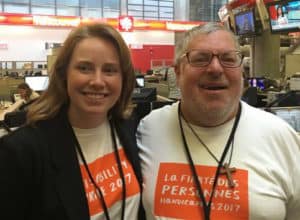
In today’s Throwback Thursday post, we’d like to share a talk given by PLAN Member Lyle Lexier in 2011. Many of you will know Lyle from his presence at a variety of community gatherings. He’s always eager to meet new people and make them feel welcome.
One of Lyle’s greatest gifts is his ability to advocate, both for himself and for others. In fact, he was recently interviewed on CBC about the importance of Disability Pride.
“My Talk on Autism and Ableism”
Hi, my name is Lyle Lexier. I’m 51 years old. I’m proud to be Jewish. I love foreign languages; I studied French throughout high school and studied Spanish and German at college. I taught myself fluent Hebrew. I have a degree in Computer Science. I live independently in Vancouver. I have a wonderful Jewish community connector who has brought me closer to the Jewish community. That pleases my mother and siblings who see me making an effort to be more involved in the Jewish community. I also have a girlfriend, MM, whom I love. I have autism and I’m going to talk to you about my experience with being a person with autism. The autism isn’t me; it’s just a label.
First I’m going to talk about ableism, a term used to describe discrimination against someone with a disability. It is unfortunate that even today bigotry is evident among those dealing with people with autism and other developmental disabilities.
I prefer to use the term “diverse ability” to refer to people with disabilities as they can have diverse abilities and talents just like everyone else. (Some of these talented people can be musical, mathematical or language savants.) Although some people with autism have savant qualities, most people with autism do not. We strive to live a normal life just as a neurotypical person would. Autism is a spectrum disorder meaning there are different degrees of autism from mild autism, also called Asperger’s, to severe autism. People with autism have different interests, even those with the same degree of autism. For example, one person might be obsessed with trains while another might be fascinated by bus schedules and weather. Many people with autism have obsessions with their favourite topics.
I face many challenges as a man with autism: I lack the ability to make close friends, I’m not able to read facial expressions or body language, I can’t recognize a face unless I stare at it many times or see the person over and over again. I may, at times appear rude, shy, selfish, or inconsiderate. Because it’s hard for me to read people, I sometimes misunderstand what a person’s real intentions are and might be too trusting of someone with bad intentions. I take everyone at face value, making it easy for people to take advantage of me at times.
I experienced bullying at school because of my autism.
I cope, as a person with autism, by learning patience as people get to know me and NOT judge me, by doing relaxation exercises such as yoga and prayer, by getting involved in my special interests such as foreign languages, dinosaurs, playing piano or guitar or watching sports (Vancouver Canucks and BC Lions). Educating people about autism and other disabilities is also an important coping skill for me.
Not everyone with autism is the same. Some misconceptions are that people with autism don’t like to socialize, don’t want to make eye contact, don’t want friends, don’t want to be touched (which is true in some cases, but not for everyone). There are different types of autism and varying degrees of autism. People with autism have different personalities and varying interests. The only suffering I undergo is when others perceive and treat me as an inferior person. What I really want people to understand is that just because a person has autism does not mean that they are violent or dangerous, mean or stupid or childish. I don’t want to be called a “retard” or “stupid”.
I want to see a world where all human beings are equal. We all want the same things: a girlfriend or boyfriend, our own apartment, a job, independence, friendship. Next time you meet a person with any disability remember to treat them with respect and dignity.